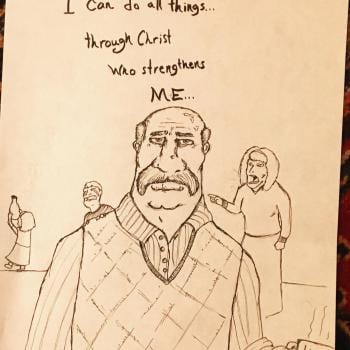Me trying to read literally anything. And boy does she have a lot of teeth.
Well, this is an absolutely brilliant book review. I clicked on it because I’m halfway through The Innocent Anthropologist Abroad, which I stole from my parents a while ago, but then left sitting next to my bed in that guilty pile-up of books you plan to have read yesterday. Nigel Barley, on the book cover, is said to do “for anthropology what Gerald Durrell did for animal collecting.”* Truly, I miss the world of superstar animal collectors and anthropologists—and not those of ghastly Animal Planet fame, but of perfect English prose.
Anyway, I read this bit last night, and died laughing, and also crying, and then had more dentist nightmares—Barley has accidentally sent his car into a ravine and bashed his mouth and after several weeks of hoping it would be fine, given up and gone looking for help in a nearby town:
As soon as the surgery door opened, I found myself propelled by waiting Africans to the front of the queue. Within was a certain amount of dilapidated dental equipment and a large diploma from the University of Lyons, which reassured me somewhat. I explained the problem to a huge man inside. Without more ado, he seized a pair of pliers and pulled out my two front teeth. The unexpectedness of the attack somewhat dulled my senses to the pain of the extraction. The teeth, he declared, were rotten. Perhaps, he hinted darkly, they had always been rotten. He had removed them. I was cured. I should pay the nurse outside. I sat blankly in the chair, blood gushing down my shirtfront, and tried to make him understand that he could now proceed to the next stage of his treatment. It is not easy to argue in a foreign tongue in the absence of two front teeth; I made little progress. Finally, he understood that I was a difficult patient. Very well, he declared huffily, if I was not content with the treatment, he would bring the dentist himself.
Really, you should buy and read the whole thing, if you can get it. Not only is it funny, and a fascinating study of the group he went to live with, but it is a gripping view into one of those old-timey practices in going to some other place to really understand what we like to call The Stranger. Truly, in these new and shinier days, we are much better at talking about this kind of thing than actually doing it.
Or so saith the reviewer of Gladwell’s new book. As I said, such a funny and great review, here are just some of the gorgeous gems:
Usually, Gladwell writes, “we put aside these controversies after a decent interval and move on to other things.” But not him. “I don’t want to move on to other things.” Then he moves on to other things: the first meeting between Cortés and Montezuma in the 16th century, Adolf Hitler’s snow job of Neville Chamberlain, a sneaky Cuban spy who embedded herself in the upper ranks of the Pentagon, Jerry Sandusky and his enablers, Bernie Madoff and his pigeons, the suicides of the poets Anne Sexton and Sylvia Plath, and many more. Each of these unhappy episodes, Gladwell writes, was caused by the faulty “translation strategies” used by the men and women involved. “Talking to Strangers,” he says, “is about why we are so bad at that act of translation.” Like Lewis Carroll’s Walrus, then, Gladwell thinks the time has come to talk of many things. Too many, in fact.
I mean, I haven’t read the book, and I’m not going to, but is it possible that one of the reasons that some of us are bad at translation is that we haven’t really bothered to try? Isn’t the first step wanting to understand another person, and most of us don’t want to? As I said, I’m not going to read the book because just as soon as I finish The Innocent Anthropologist I’m going to finish Nora Ephron’s I Feel Bad About My Neck and Rumer Godden’s The Battle of the Villa Fiorita and a couple of other tomes I have lying around.
But seriously, the review is so great:
In its most decadent and easily marketed form, social science specializes in taking axioms known to every 19th-century schoolteacher and duding** them up as heuristics or effects or biases. Believing that “a bird in the hand is worth two in the bush” thus becomes loss aversion. “Counting your chickens before they’re hatched” gets the fancy treatment as projection bias. If you prefer information that seems agreeable to your point of view, social science teaches that you suffer from confirmation bias—no less a defect for having been shared by every human being who ever lived. People who fall for someone because their parents can’t stand her or him are exhibiting the Romeo and Juliet effect. Really. In social psychology, it’s a thing.
You are my Spirit Animal Reviewer, Sir. No matter what happens today, I can die happy, or have all my teeth removed:
Levine designed a series of ingenious experiments on college kids to “discover” a universal human truth: All things being equal, we are much more likely to believe that people are telling the truth than that they are lying. Gladwell seems more impressed by this insight than he should be. He calls it a “profound point.” If nothing else, it’s certainly an obvious one. If we didn’t default to truth, we would find it hard to function in the world.
The review ends this way:
Of course, if Malcolm Gladwell had practiced epistemological humility for the past 20 years, he would have sold millions fewer books. But let’s pass over the irony. When you’re talking to millions of strangers, as Gladwell does, saying nothing in particular is better than telling them things that aren’t so. He may have embarked on an exciting new career.
I mean, I haven’t read anything by Malcolm Gladwell, but I did adore his podcast on how and why McDonald’s ruined their perfect french-fries. He is a bewitching*** podcaster and his soothing voice and perfectly paced storytelling have gotten me through a lot of loads of laundry. But I do sort of love that he is not the perfect writer. If he were—which is what I had been lead to believe—I would have been eaten up with envy. Now I can just resume my usual life.
*I just remind you, that if you haven’t read Gerald Durrell, starting with My Family and Other Animals and going on from thence, you haven’t really read books.
**Can I really use ‘dude’ as a verb? I will never be said again–NEVER.
***In my laziness, I got up ‘fascinating’ on my thesaurus page and have just gone down the list.













